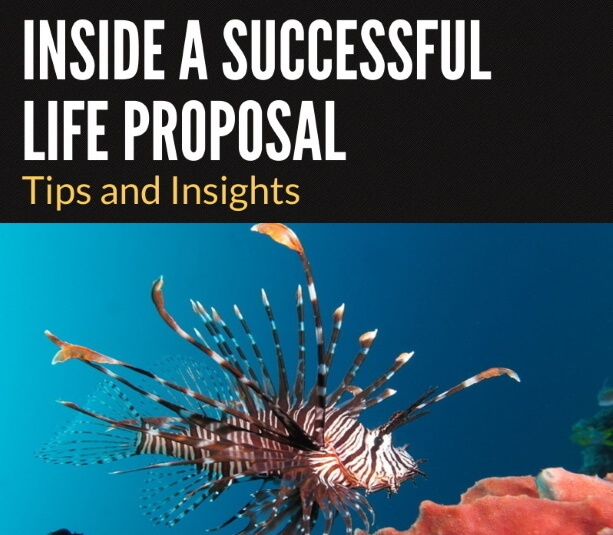
How much time will you need to prepare a successful LIFE Proposal? How do you find the best partners? Can the NCP (National Contact Point) be of any use to you?
This is the fourth in a short series of articles, which will allow us to dive into the preparation of a successful LIFE Proposal. In this article, RELIONMED-LIFE explains how they applied for their nature and biodiversity project.
Can you briefly describe your project?
The RELIONMED-LIFE project aims to make Cyprus the ‘first line of defence’ against the invasion of the lionfish (Pterois miles) in the Mediterranean.
More specifically the Project’s aims are:
- Develop the necessary capacity and mechanisms in Cyprus so the country can act promptly and effectively against the lionfish invasion, and other invasive species from the Red Sea;
- Demonstrate the effectiveness of a range of lionfish invasion prevention measures, such as the development and implementation of an early surveillance and detection system and a removal response system;
- Build capacity and knowledge which can be transferred and replicated by other countries of the Mediterranean, so they can control lionfish expansion in their waters.
The Project’s objectives are:
- Assess the risks associated with the lionfish and inform stakeholders;
- Demonstrate the effectiveness of ‘Removal Action Teams’ in coordinated and opportunistic lionfish removals around Cyprus;
- Demonstrate coordinated removals in priority areas such as near/within the Natura 2000 sites, Cape Greco and Nisia, and nearby artificial reefs in Marine Protected Areas, where lionfish aggregate;
- Explore potential small local market niches that would make future removals economically sustainable;
- Develop tools and guides for managers;
- Transfer cost-effective practices, and train key stakeholders in neighbouring countries and establish a coordinated response to tackle the cross-border issue of lionfish and invasive alien species.
How long did it take you to prepare the full proposal?
It took us one month to develop the concept note, write abstracts of work packages, meet with potential partners and build the team.
Following this, it took us a full summer of almost full dedication by two researchers, each one focusing on a different part of the proposal. In addition, we also had a third member in the writing team, who was working part-time and had experience in the Administrative and Financial components of the proposal.
To note that we had a very mature idea and preparatory work had been done before starting to develop the full proposal. As a result the dedicated writing team was able to deliver a well written proposal on time.
How did you find your project partners?
We, Marine & Environmental Research (MER) Lab, knew our project partners before the call opened. We contacted each one independently and presented the project’s concept note before proceeding with the proposal development. All those contacted agreed to participate.
Building the team was done in a strategic manner, aiming to develop a team that matches the expertise criteria set by the proposed plan of work. Each member of the consortium must have an important role to play, a member’s role must be justified, and tasks assigned must match the expertise of the partnership member.
Our aim was to join forces and unify the marine research elite of Cyprus by including key players that could tackle the problem of the lionfish invasion around the island. Our team includes local and UK marine experts from different types of entities: SME (MER Lab), NGO (Enalia Physis), two Universities (University of Cyprus and University of Plymouth) and the regulatory governmental body (Department of Fisheries and Marine Research).
Did you reach out to your NCP for any support?
Before going all in with the proposal development, we attended an Info Day held by the NCP, where information about the call of interest was presented, as well as examples of winning proposals. This was a great opportunity to learn useful tips, answer questions, as well as share our idea and discuss with the NCP. Attending this Info Day truly helped us with the preparation of what turned out to be a successful proposal.
What are your 3 lessons for future applicants?
- Have a good concept, one that is relevant and fit to the call’s objectives.
- Timing is everything; the proposal needs to address a contemporary and hot issue.
- In your proposal emphasize links to the call’s objectives and describe how your project will address them. Try to quantify what will be achieved, build a partnership that justifies the purpose and allow each partner to lead parts of the project that they are good at.
Find out more about the RELIONMED-LIFE Project here.
Read more insights from LIFE-WithVulturesCY, Organiko LIFE+ and LIFE AMIA projects.
To find out if your idea could be funded under the LIFE Programme contact us today. To keep reading our articles subscribe to our newsletter.


